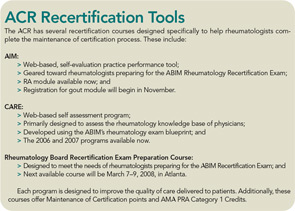With the time constraints, stress, and lack of resources rheumatologists and other healthcare professionals face everyday, it can be challenging to find educational programs that not only provide measurable effects on the quality of patient care, but also offer resources to equip you for the ever-changing world of healthcare.
Jonathan Krant, MD, MPH, recently took three ACR continual professional development programs that do just that: the Rheumatology Board Recertification Exam Preparation Course; Assess, Improve, Measure (AIM); and Continuing Assessment Review and Evaluation (CARE). (See “ACR Recertification Tools,” above left.)
As an associate professor of medicine at the University of Massachusetts, director of the teaching program at Berkshire Medical Center, and a volunteer in his community, Dr. Krant looks for educational opportunities that respect his resources and constraints as a busy healthcare professional.
In March, Dr. Krant participated in the ACR Rheumatology Board Recertification Exam Preparation Course in Philadelphia. The course is specifically designed for rheumatologists preparing for the American Board of Internal Medicine (ABIM) Rheumatology Recertification Exam. Much like the exam, the course is case based. “The course review was pithy and relevant to what we do clinically,” says Dr. Krant. “The questions on the exam are practice oriented. They really are oriented toward the clinician who cares for patients.”
According to Dr. Krant, the Recertification Exam Preparation Course covers several issues of importance in great detail. Intensive and interactive by design, the course offers reviews of the diagnosis, management, and treatment of rheumatic diseases as well as major developments in rheumatology in the past 10 years. It also provides a forum to interact with experts and participate in group discussion to answer medical cases.
Continuing with the ACR’s recertification resources, Dr. Krant took part in the ACR AIM Practice Improvement Module. This Web-based practice improvement tool is designed for rheumatologists engaged in the ABIM Maintenance of Certification program or for those who are interested in completing a quality-improvement program. All of the AIM questions relate directly to evidence-based quality measures. Dr. Krant describes the module as a way of obtaining an “in-depth analysis of your practice patterns with a series of questions aimed at improving compliance rates.”
After working through the module, data culminate in an automated report that enables each physician to reflect on practice performance data, identify practice strengths and areas for improvement, develop and implement an improvement plan, assess the affect of change through re-measurement, and report any changes found. “It’s really there to establish that you’re meeting the minimum standard of practice with respect to disease recognition and treatment, but also are exceeding that minimum by assuring quality of care and minimum morbidity for patients who are managed according to appropriate standards of care,” Dr. Krant says of the module. After working through it, he feels that it “reaffirms the importance of adequacy of follow-up, anticipating potential toxicities in therapy, and choosing the appropriate forms of therapy this day and age.”
